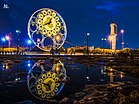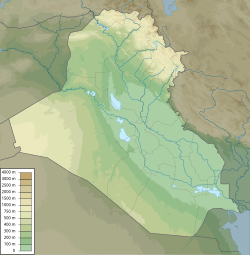Basra
ٱلْبَصْرَة Basrah | |
|---|---|
| Nickname: Venice of the East[1] | |
 | |
| Coordinates: 30°30′54″N 47°48′36″E / 30.51500°N 47.81000°E | |
| Country | |
| Governorate | Basra |
| Founded | 636 AD |
| Government | |
| • Type | Mayor–council |
| • Mayor | Asaad Al Eidani |
| Area | |
| • Metropolis | 50−75 km2 (21 sq mi) |
| • Metro | 181 km2 (70 sq mi) |
| Elevation | 5 m (16 ft) |
| Population (2024) | |
| • Metropolis | 1,485,000[2] |
| Time zone | UTC+3 (AST) |
| Area code | (+964) 40 |
| Website | www |
Basra (Arabic: ٱلْبَصْرَة, romanized: al-Baṣrah) is a port city in southern Iraq. It is the capital of the eponymous Basra Governorate, as well as the third largest city in Iraq overall, behind only Baghdad and Mosul. Located near the he Iran–Iraq border at the north-easternmost extent of the Arabian Peninsula, the city is situated along the banks of the Shatt al-Arab that empties into the Persian Gulf. Basra is consistently one of the hottest cities in Iraq, with summer temperatures regularly exceeding 50 °C (122 °F). The hottest recorded temperature in Basra is 53.9°C. A major industrial center of Iraq, the majority of the city's population are Shi'ite Muslim Arabs.
The city was built in 636. It played an important role as a regional hub of trade and commerce in the Islamic Golden Age. Historically, Basra is one of the ports, from which the fictional Sinbad the Sailor journeyed. It was occupied by the Safavid, from 1697 to 1701. Basra came under Portuguese control, from 1526 to 1668. The city remained under the administration of the Ottoman Empire, as part of Basra vilayet, which was populated mainly by Shi'ite Muslims and flourished as a commercial and trade center. During the World War I, the British forces captured Basra and incorporated it into the Mandate for Mesopotamia, and subsequently Mandatory Iraq, under the rule of Faisal I and influenced by the United KIngdom.
It became part of the independent Kingdom of Iraq in 1932. Basra was point of conflict between Iraq and Iran over the Shatt al-Arab. In the 1970s, the city experienced an economic boom. Basra was targeted by the Iranian Forces during the Iran–Iraq War, as part of the War of the cities. The city was also affected, as a result of the Gulf War, the 1991 uprisings and the 1999 uprisings. Basra was the first city to be occupied by the coalition forces, during the 2003 invasion of Iraq. Since the end of the war, Basra's prosperity has gathered numerous population. Today Basra's majority is of Arab Shi'ite Muslims, with Sunni Muslims and Christians as minority.
Iraq's main port city, Basra is known as the country's economic capital. It has emerged as an important commercial and industrial center for the country, as the city is home to a large number of manufacturing industries ranging from petrochemical to water treatment. Basra is home to numerous tourist spots including mosques, palaces, churches, synagogues, parks and beaches. It has transformed itself into a modern bustling metropolis, with a port and airport. In recent years, the city has attracted a large number of investments, increasing its prosperity.
- ^ Sam Dagher (18 September 2007). "In the 'Venice of the East,' a history of diversity". The Christian Science Monitor. Retrieved 2 January 2014.
- ^ "Basra, Iraq Metro Area Population 1950-2024". macrotrends.net. Retrieved 5 June 2024.








